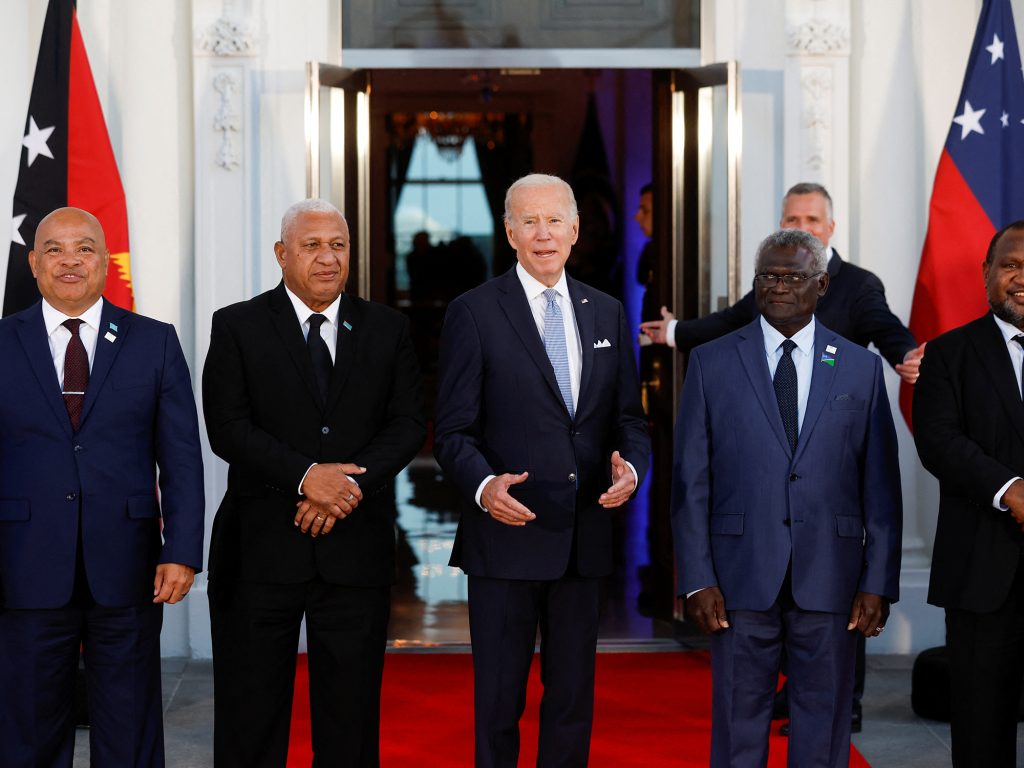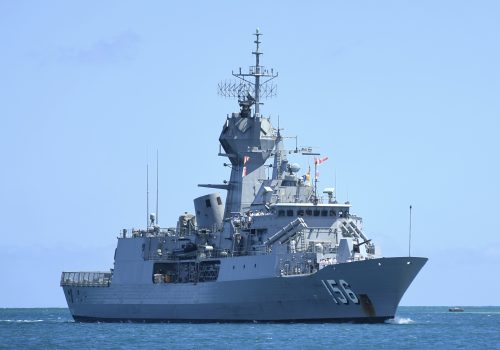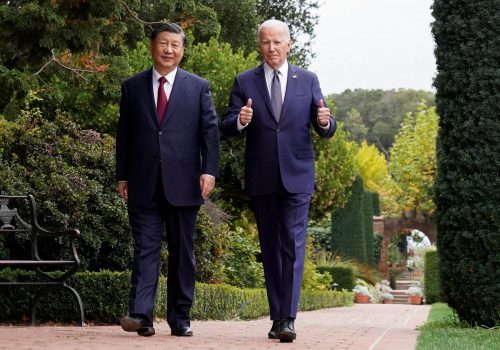There are rising worries in Washington that a future military conflict over Taiwan could result in a dramatic and costly US defeat at the hands of the People’s Republic of China (PRC). But there is a different prospect for a strategic defeat in the Pacific that is much more imminent while receiving much less attention. This defeat would be on a political and economic battlefield rather than a military one. And the key to avoiding this defeat is on Capitol Hill, not at the Pentagon.
As it works through its year-end to-do list, Congress needs to pass fresh US Compacts of Free Association (COFAs) with the Federated States of Micronesia (FSM), Palau, and the Republic of the Marshall Islands (RMI). All three countries, which freely associate with the United States by choice, are crucial to the US Indo-Pacific Strategy by virtue of their geographic location and sheer maritime breadth.
Beijing has sought to assert its strategic influence in these countries, as it has elsewhere in the Pacific. As Axios wrote last week, “Beijing is persistently courting one of America’s closest partners in the Pacific” through infrastructure investments, gifts to leading politicians, and more. Among these three nations, efforts aimed at the FSM have perhaps been the most substantive.
Some of the PRC’s undertakings, such as building schools, may appear above board and bring benefits to the people of the FSM. But the PRC’s efforts come with malign intent that aims to undermine the FSM’s space to make sovereign decisions. As David Panuelo, who served as president of the FSM from 2019 to 2023, wrote in a March letter:
“It is on this basis that Political Warfare and Grey Zone activity occur within our borders; China is seeking to ensure that, in the event of a war in our Blue Pacific Continent between themselves and Taiwan, that the FSM is, at best, aligned with the PRC (China) instead of the United States and, at worst, that the FSM chooses to abstain altogether.”
Geopolitical competition with the PRC helped spur US action, which culminated in the successful negotiation of new twenty-year COFAs with all three countries. However, they still need to be approved by Congress. The COFA with Palau does not expire until September 30, 2024, but those with the FSM and RMI expired on September 30, 2023. While the five COFA-related agreements with the FSM and RMI await congressional consent, the expired ones have been extended until February 2, 2024.
Short-term extensions may be better than nothing, but leaders of the freely associated states have advocated for Congress to expedite approval of the new agreements. At a time of legislative gridlock, it will be difficult to pass them in a stand-alone bill; instead, the most likely way to secure passage is to attach them to a bigger piece of legislation that is more likely to pass.
There are two possible vehicles left this year. The House and Senate are currently negotiating to finalize the fiscal year 2024 National Defense Authorization Act (NDAA), while talks continue in the Senate on the administration’s supplemental funding request for Ukraine, Israel, the Indo-Pacific, the US border, and global needs.
In a letter to Congress today, Panuelo urged legislators to include these agreements in a supplemental funding package. Panuelo and other proponents initially sought their inclusion in the NDAA, which is traditionally viewed as must-pass legislation, but they were ultimately not included due to disagreements over whether and how to offset the spending authorized by the agreements with cuts elsewhere.
Senate Democrats included the COFA-related agreements in their proposed supplemental spending package. While a procedural vote on this package failed Wednesday due to disagreements over wholly unrelated provisions, inclusion of the agreements is nonetheless a step in the right direction and a positive indication of congressional intent.
By formally transmitting them to Congress this week, the Biden administration has signaled the importance of passing the compacts in a timely manner. Legislating may often look messy from the outside—the old adage about seeing how the sausage is made comes to mind—but broad bipartisan support for renewing the COFAs bolsters their prospects for passage, however it may ultimately come about.
With that said, failure to secure their passage remains a possibility, an outcome that would truly be an own goal against US strategic interests in the Indo-Pacific. As Panuelo put it in today’s letter:
“The U.S. Congress needs to appreciate that if you don’t fund the Compact of Free Association this December of 2023, it will not simply allow China an opening in Palau, Marshall Islands and the Federated States of Micronesia, it will strengthen China’s ongoing infiltration in the region. America is already on the precipice of losing the North Pacific to Chinese influence and propaganda.”
Regardless of the form it takes, the US Congress needs to take concerted bipartisan action to prevent a self-inflicted defeat in the strategic competition with Beijing and to help ensure a free and open Indo-Pacific. We are running out of time.
Markus Garlauskas is the director of the Indo-Pacific Security Initiative at the Scowcroft Center for Strategy and Security. He is a former senior US government official with experience as an intelligence officer and strategist, including twelve years stationed overseas in the region. He posts as @Mister_G_2 on X.
Parker Novak is a nonresident fellow with the Atlantic Council’s Global China Hub and Indo-Pacific Security Initiative, where he specializes in Southeast Asia, the Pacific Islands, Indo-Pacific geopolitics, and US foreign policy. He also is the deputy government relations director for the US Global Leadership Coalition, which advocates for a stronger international affairs budget. The views expressed in this piece are the authors’ and do not reflect those of Novak’s employer.
Further reading
Wed, Nov 22, 2023
China’s acoustic aggression against a US ally follows a pattern. Military talks won’t help.
New Atlanticist By Markus Garlauskas, Philip W. Yu
On November 14, a Chinese warship used its active sonar to harass and injure two Australian Royal Navy divers with high-powered sound waves.
Wed, Nov 15, 2023
Experts react: What did Biden and Xi’s ‘candid’ meeting accomplish?
New Atlanticist By
Atlantic Council experts break down the US and Chinese leaders' four-hour summit and what's coming next.
Wed, Nov 15, 2023
Global China Newsletter: Xi and Biden dazzle, but don’t be blinded to action elsewhere
Global China By Dexter Tiff Roberts
The November 2023 edition of the Global China newsletter.
Image: US President Joe Biden speaks as he poses with Federated States of Micronesia's President David Panuelo, Fiji's Prime Minister Frank Bainimarama, Solomon Islands Prime Minister Manasseh Sogavare and Papua New Guinea's Prime Minister James Marape and other leaders from the US-Pacific Island Country Summit at the White House in Washington, DC on September 29, 2022. Photo via REUTERS/Jonathan Ernst.



